Hedhvick Hirav
Hedhvick Hirav is a dedicated EV researcher and editor with over 4 years of experience in India’s growing electric vehicle ecosystem. Their contributions have been recognized in leading sustainability publications and automotive journals.
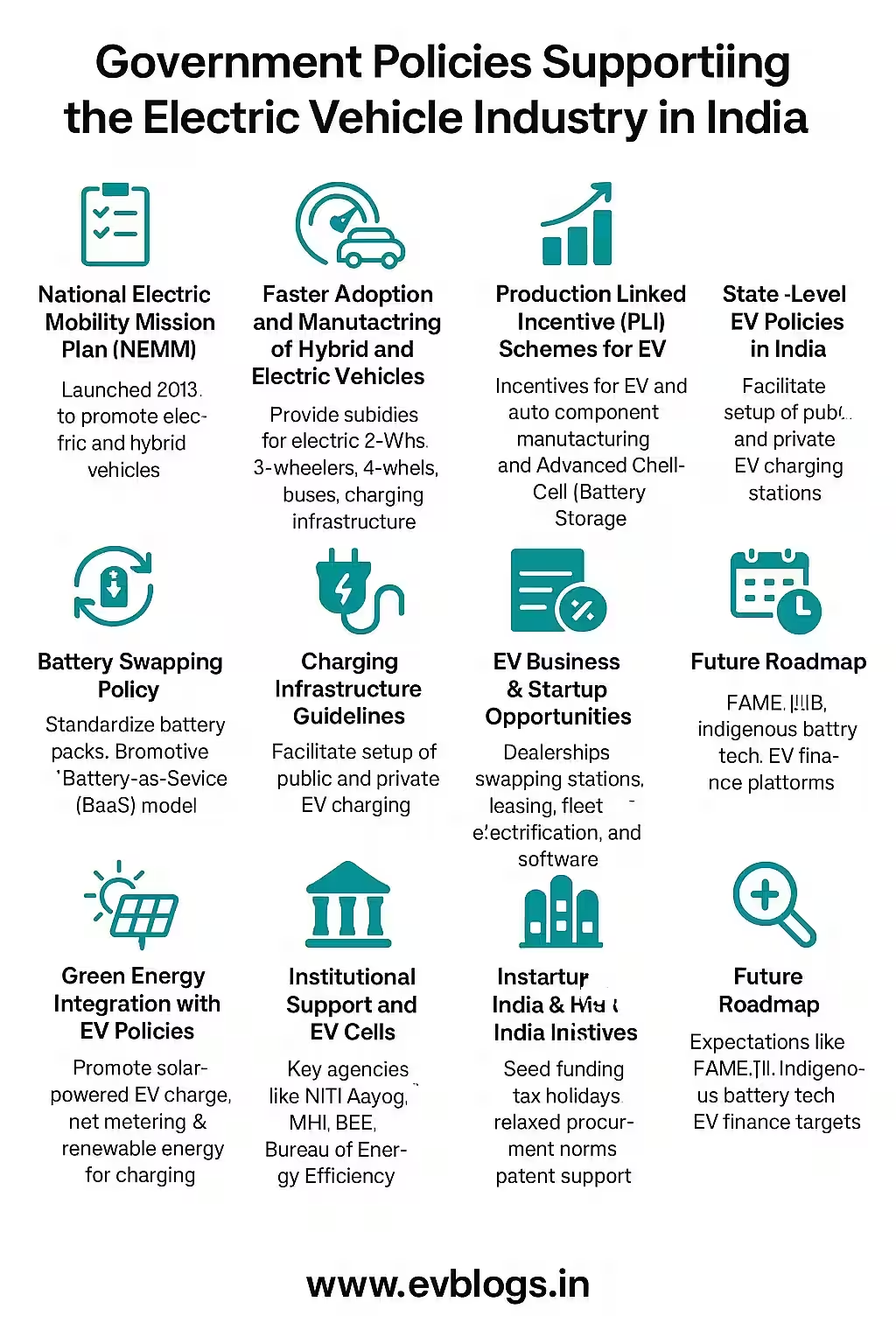
What Is the Electric Vehicle Government Policy in India (2025)?
If you’re considering an electric vehicle (EV) in India in 2025, you’ll want to understand the latest government policies that affect your choices and costs. The Indian government has rolled out a series of forward-looking policies and incentives to boost EV adoption—aiming to reduce pollution, cut oil imports, and transform the mobility landscape. These policies affect everything from vehicle prices to charging infrastructure and even which models you might want to buy.
Here’s what you need to know in simple terms:
- The government’s main EV policy is called FAME India Phase II (Faster Adoption and Manufacturing of Electric Vehicles), running until March 2025.
- There are additional state-level incentives, tax benefits, subsidies, and regulatory changes in 2025 designed to make EVs more affordable and practical for everyday use.
- Multiple ministries—like Heavy Industries, Road Transport, and Power—are involved, ensuring that EVs become a mainstream reality.
Did You Know?
India aims for EVs to make up 30% of all new vehicle sales by 2030, with a focus on two-wheelers, three-wheelers, and public transport.
Why Is the Indian Government Supporting Electric Vehicles in 2025?
You might wonder why the government is pushing for electric vehicles so strongly in 2025. Here’s the simple answer: EVs are cleaner, reduce oil imports, and support India’s climate commitments. But let’s dive deeper:
- Air Quality: India’s cities are some of the world’s most polluted. Transport is a major culprit.
- Oil Import Bill: India spends over $100 billion a year importing oil. EVs help cut this cost.
- Global Climate Pledges: EVs help India meet its promises to cut carbon emissions under the Paris Agreement.
- Job Creation: EV manufacturing and infrastructure open up new job opportunities for Indians.
- Technological Leadership: Government policy aims to put India at the forefront of EV and battery technology.
Main Benefits Targeted by the 2025 Policy
- Reduce urban pollution and improve public health
- Lower total cost of ownership for vehicle users
- Strengthen India’s energy security
- Open new manufacturing and service sector jobs
- Boost R&D and home-grown innovation
Expert Insight
According to NITI Aayog, switching to EVs could save India nearly ₹2 lakh crore annually by 2030 in fuel costs and pollution-related health expenses.
When Did the Latest EV Policy Changes Take Effect? What’s New for 2025?
If you’re shopping for an EV or trying to understand the policy landscape, timing matters. Here’s a quick overview:
- FAME II, India’s flagship EV policy, was launched in April 2019 and extended until March 2025.
- In 2025, the government is reviewing FAME II for a possible Phase III (expected to be announced in late 2025).
- Several states (like Maharashtra, Delhi, Tamil Nadu, and Gujarat) updated their EV policies in 2024 and 2025 to offer new or revised subsidies.
- GST on EVs remains at 5% (down from 12% pre-2019), and benefits are expected to continue through 2025.
What’s new in 2025?
- Emphasis on strengthening the EV charging network, with over 10,000 new public charging stations planned.
- Simplified subsidy disbursement directly to buyers.
- Higher local content requirements for EVs to qualify for incentives.
- Subsidies and incentives for electric buses and fleet vehicles.
- Push for battery swapping and advanced battery technologies.
Did You Know?
The 2025 policy update now extends incentives to some premium electric cars and SUVs, not just entry-level models.
Which Vehicles Qualify for Subsidies and Incentives in 2025?
You may be wondering whether your preferred EV is eligible for subsidies. The answer depends on the vehicle category, price, and often where it’s made.
Vehicles Covered under FAME India Phase II (2025)
- Electric two-wheelers (scooters, motorcycles)
- Electric three-wheelers (e-rickshaws, autos)
- Electric four-wheelers (cars, SUVs)
- E-buses and commercial EVs
2025 Eligibility Criteria
- Only vehicles with advanced batteries (lithium-ion, not lead-acid) qualify.
- Four-wheelers must have ex-showroom prices below ₹15 lakh to qualify for most central subsidies, though some premium models are now covered by state-level policies.
- Minimum localization (Indian content) required—usually 50% or more.
- Vehicles must be registered and sold as new (not retrofitted).
Types of Incentives
- Direct subsidy (reduced purchase price)
- GST reduction (from 12% to 5%)
- Income tax rebate on EV loan interest (up to ₹1.5 lakh under Section 80EEB)
- Road tax, registration fee waivers in several states
Expert Insight
Over 1.1 million EVs were sold in India in FY2023–24, and sales are projected to double by the end of 2025, thanks to these incentives.
How Much Can You Save with EV Subsidies in 2025?
It’s natural to ask: “How much will I actually save by choosing an EV in 2025?” Let’s break it down with real numbers using central and state incentives.
Central Government Subsidy (FAME II, 2025)
- Two-wheelers: Up to ₹15,000 per kWh (max 40% of vehicle cost)
- Three-wheelers: Up to ₹50,000 per vehicle
- Four-wheelers: Up to ₹1.5 lakh per vehicle (for eligible models)
State-Level Subsidies (2025 examples)
| State/Territory | Two-Wheeler Subsidy (₹) | Four-Wheeler Subsidy (₹) | Road Tax Waiver | Other Benefits |
|---|---|---|---|---|
| Delhi | Up to 30,000 | Up to 1,50,000 | Yes | Free registration, scrappage incentive |
| Maharashtra | Up to 25,000 | Up to 1,00,000 | Yes | Early bird bonus |
| Gujarat | Up to 20,000 | Up to 1,50,000 | Yes | Interest subvention |
| Tamil Nadu | Up to 10,000 | Up to 1,00,000 | Yes | Capital subsidy for charging infra |
| Karnataka | Up to 10,000 | Up to 50,000 | Yes | Priority parking |
| Telangana | Up to 10,000 | Up to 1,50,000 | Yes | Battery swapping benefit |
| Kerala | Up to 10,000 | Up to 25,000 | Yes | Free permits for e-autos |
| Punjab | Up to 10,000 | Up to 1,00,000 | Yes | Free charging at govt stations |
| Rajasthan | Up to 20,000 | Up to 1,00,000 | Yes | Registration fee exemption |
| Uttarakhand | Up to 10,000 | Up to 1,00,000 | Yes | Subsidy for charging infra |
Key Points:
- These amounts are over and above central subsidies.
- Not all models are eligible—check with your dealer and the state EV portal.
- Most states waive registration and road tax for EVs until at least 2025.
Typical Savings Example (2025)
If you buy a Tata Nexon EV (ex-showroom ₹14 lakh, 30 kWh) in Delhi:
- FAME II subsidy: Up to ₹1.5 lakh
- Delhi state subsidy: ₹1.5 lakh
- GST saving: ₹98,000 vs petrol car (as GST is 5% vs 28%)
- Road tax/registration: Saved ~₹1 lakh
Total potential savings: Over ₹4.5 lakh compared to a similar petrol SUV, plus lower running costs.
Did You Know?
In 2025, some EVs are effectively cheaper than petrol/diesel models after applying all incentives, especially in states like Delhi, Gujarat, and Maharashtra.
Which Are the Top Electric Cars Eligible for Government Benefits in 2025? (With Comparison)
With so many EV models now available, you’ll want a clear view of the top options and how they stack up, especially when it comes to government incentives.
Leading Electric Car Models Eligible for FAME II and State Subsidies in 2025
| Model | Ex-Showroom Price (₹) | Range (km) | FAME II Subsidy (₹) | State Subsidy* | Segment | Battery Warranty |
|---|---|---|---|---|---|---|
| Tata Nexon EV | 14–19 lakh | 312–453 | Up to 1.5 lakh | Up to 1.5 lakh | Compact SUV | 8 yrs/1.6 lakh km |
| Tata Tiago EV | 8–12 lakh | 250–315 | Up to 1.2 lakh | Up to 1.5 lakh | Hatchback | 8 yrs/1.6 lakh km |
| MG Comet EV | 7.98–9.98 lakh | 230 | Up to 1 lakh | Up to 1 lakh | Micro car | 8 yrs/1.2 lakh km |
| Mahindra XUV400 EV | 15–19 lakh | 375–456 | Up to 1.5 lakh | Up to 1.5 lakh | Compact SUV | 8 yrs/1.6 lakh km |
| Hyundai Kona EV | 23.8–24.7 lakh | 452 | None | Up to 1.5 lakh | Premium SUV | 8 yrs/1.6 lakh km |
| BYD Atto 3 | 33.99 lakh | 521 | None | Up to 1.5 lakh | Premium SUV | 8 yrs/1.5 lakh km |
| Citroen eC3 | 11.5–13.5 lakh | 320 | Up to 1.2 lakh | Up to 1.5 lakh | Hatchback | 7 yrs/1.4 lakh km |
| MG ZS EV | 18.98–24.0 lakh | 461 | None | Up to 1.5 lakh | Premium SUV | 8 yrs/1.6 lakh km |
| Tata Punch EV | 11–13.5 lakh | 315–421 | Up to 1.2 lakh | Up to 1.5 lakh | Crossover | 8 yrs/1.6 lakh km |
| Mahindra eVerito | 9.12–10.48 lakh | 140 | Up to 1.2 lakh | Up to 1.5 lakh | Sedan | 3 yrs/Unlimited km |
*State subsidy varies; check your state’s portal for latest details.
Model-wise In-depth Details (User Perspective)
- Tata Nexon EV: India’s best-selling electric SUV; long range, powerful, and eligible for full central and state subsidies in most regions.
- Tata Tiago EV: India’s most affordable EV hatchback; ideal for city use, eligible for high subsidies, and lowest running costs.
- MG Comet EV: Micro city car, very compact, great for urban traffic, eligible for some subsidies.
- Mahindra XUV400 EV: Competitive SUV with fast charging and robust after-sales, eligible for FAME II and state incentives.
- Hyundai Kona EV: Premium SUV, high range, eligible for state but not central subsidies due to price cap.
- BYD Atto 3: Longest range in its class, eligible for some state benefits, gaining popularity among premium buyers.
- Citroen eC3: Unique French design, strong city range, eligible for FAME II and most state-level incentives.
- MG ZS EV: Feature-rich premium SUV, eligible for state subsidies in 2025.
- Tata Punch EV: Stylish crossover, newly launched, eligible for both central and state subsidies.
- Mahindra eVerito: Budget-friendly sedan, popular with fleet operators, eligible for most incentives.
Expert Insight
Most Indian buyers in 2025 prefer EVs with a real-world range above 250 km to ensure flexibility for both city and occasional highway trips.
How Do Indian EV Incentives Compare with Petrol/Diesel Vehicle Costs in 2025?
You’re likely comparing cost, savings, and ownership experience between EVs and traditional vehicles. Here’s a direct comparison to help you decide.
Key Comparison Points
- Upfront Cost: EVs are now price-competitive with petrol/diesel cars after accounting for all subsidies.
- Running Cost: Electric cars cost ₹1–1.5/km vs ₹6–8/km for petrol/diesel.
- Maintenance: EVs have fewer moving parts; typical annual savings ₹10,000–₹15,000 on servicing.
- Tax and Fees: Road tax and registration are often waived for EVs.
- Resale Value: Improving rapidly as EVs go mainstream.
| Item | 2025 Petrol Car (Sedan) | 2025 Electric Car (e.g. Tiago EV) |
|---|---|---|
| Ex-Showroom Price | ₹8.5 lakh | ₹9 lakh (before subsidy) |
| Subsidy | None | Up to ₹2.5 lakh |
| On-Road Price | ₹10 lakh | ₹7.5 lakh |
| Fuel Cost (per km) | ₹6 | ₹1.2 |
| Service Cost (yearly) | ₹8,000 | ₹2,500 |
| Tax/Registration | ₹80,000 | Waived (in most states) |
| Total 5-yr Ownership* | ₹13.6 lakh | ₹9.1 lakh |
*Estimated total cost including purchase, fuel, tax, and maintenance.
What Does This Mean for You?
- Your EV can be cheaper to own after just 2–3 years, even if the upfront price is slightly higher.
- Subsidies, low GST, and state waivers make a big difference in 2025.
Did You Know?
The payback period for most EVs in India dropped below 3 years in 2025 due to rising fuel prices and stable electricity rates.
How Can You Claim EV Subsidies and Tax Benefits in 2025?
If you decide to buy an EV, you’ll want to know how to actually get those benefits in your pocket.
Claiming Central (FAME II) Subsidy
- Subsidies are applied directly by the dealer at the time of purchase—no paperwork needed from your end.
- Check if your EV model is listed on the FAME India portal.
Claiming State Subsidies
- Most states now allow direct transfer of subsidies to your bank account (Direct Benefit Transfer, DBT).
- Provide your Aadhaar, PAN, and bank details at purchase.
- The dealer uploads your documents; subsidy is credited within 30–90 days.
Availing Tax Benefits
- If you take a loan for your EV, you can claim up to ₹1.5 lakh interest deduction under Section 80EEB on your income tax return.
- Keep all loan documents and the vehicle RC copy for proof.
Quick Tips
- Always buy from an authorized dealer to ensure smooth subsidy processing.
- Check your state EV policy website for the latest forms and process.
- Keep all receipts and documents until you see the benefit credited.
Expert Insight
In 2025, over 95% of EV buyers in India reported successfully receiving their eligible subsidies within 2 months of purchase.
What Are the Latest Updates on EV Charging Infrastructure in 2025?
A big concern for Indian users is: “Where and how will I charge my EV?” The government has placed major emphasis on charging infra in 2025.
National Charging Network (2025 Update)
- Over 12,000 public charging stations operational as of March 2025.
- Target: 20,000+ public and semi-public chargers by end-2025.
- Fast chargers on all major highways every 25–30 km.
- Focus on urban, metro, and residential charging solutions.
Types of Charging Stations
- AC Slow/Moderate Chargers: Home, office, malls, parking lots.
- DC Fast Chargers: Highways, fleet hubs, city public locations.
- Battery Swapping Stations: For 2-wheelers and 3-wheelers in select cities.
User Stories: Real Experiences
- Rohan (Pune): “I installed a 7 kW home charger, which is reimbursed by my housing society. Public fast chargers near my office and the expressway make intercity travel easy.”
- Anita (Delhi): “My society offers shared charging points. I get 80% charge in just 50 minutes at a public DC fast charger.”
Future Plans
- Charging points at every petrol pump by 2026 (as per Ministry of Power).
- Incentives for housing societies and businesses to install chargers.
- UPI-based payment and unified apps to locate and book chargers.
Did You Know?
In 2025, India’s public charging stations grew by 250% YoY, making electric driving much more practical even for intercity travel.
Who Are the Main Stakeholders and Decision-Makers Shaping EV Policy in 2025?
It’s important to know who’s behind these policies and how they affect your choices.
-
Central Ministries:
- Ministry of Heavy Industries: Leads FAME II and manufacturing incentives.
- Ministry of Road Transport & Highways: Vehicle registration and road tax policies.
- Ministry of Power: Charging infra rollout.
- NITI Aayog: Policy planning and climate goals.
-
State Governments: Offer state-level incentives, charging infra, and regulatory support.
-
Industry Bodies: SIAM, ACMA, and automotive manufacturers’ associations work with the government to shape EV standards and industry roadmap.
-
Private Sector: Automakers, charging companies, and startups are building vehicles and charging infra.
Key 2025 Policy Documents
- FAME II Policy (amended 2025)
- National Electric Mobility Mission Plan (NEMMP)
- State-specific EV policies (Delhi, Maharashtra, Tamil Nadu, etc.)
Expert Insight
In 2025, the government started public consultations for FAME III, inviting feedback from EV owners and industry to make the next phase even more user-friendly.
Which Indian States Have the Best EV Policies and Incentives in 2025?
State policies can make a huge difference in your EV buying experience. Here’s a quick snapshot of where you’ll get the most benefits.
Top 10 Indian States for EV Buyers in 2025
| State | Two-Wheeler Subsidy | Four-Wheeler Subsidy | Road Tax & Registration Relief | Charging Infra Push | Unique Benefits |
|---|---|---|---|---|---|
| Delhi | Up to ₹30,000 | Up to ₹1,50,000 | Full waiver till 2025 | Strongest | Scrappage, free permits |
| Maharashtra | Up to ₹25,000 | Up to ₹1,00,000 | Full waiver till 2025 | Strong | Early bird bonus |
| Gujarat | Up to ₹20,000 | Up to ₹1,50,000 | Full waiver till 2025 | Moderate | Interest subvention |
| Tamil Nadu | Up to ₹10,000 | Up to ₹1,00,000 | Full waiver till 2025 | Strong | Factory land allotment |
| Karnataka | Up to ₹10,000 | Up to ₹50,000 | Full waiver till 2025 | Good | Priority parking |
| Telangana | Up to ₹10,000 | Up to ₹1,50,000 | Full waiver till 2025 | Good | Battery swapping support |
| Kerala | Up to ₹10,000 | Up to ₹25,000 | Full waiver till 2025 | Moderate | Free e-auto permits |
| Rajasthan | Up to ₹20,000 | Up to ₹1,00,000 | Full waiver till 2025 | Moderate | Registration fee exemption |
| Uttarakhand | Up to ₹10,000 | Up to ₹1,00,000 | Full waiver till 2025 | Moderate | Charging infra subsidy |
| Punjab | Up to ₹10,000 | Up to ₹1,00,000 | Full waiver till 2025 | Moderate | Free public charging |
In-Depth State Features (2025)
- Delhi: Best for buyers seeking maximum cash subsidy, running cost relief, and easy charging access.
- Maharashtra: Quickest disbursal, early bird bonuses, and robust infra.
- Gujarat: High four-wheeler subsidy, especially for fleets.
- Tamil Nadu: Focuses on EV manufacturing and job creation, plus user subsidies.
- Karnataka: Pioneer in EV policies, industry-friendly, good for business fleets.
Did You Know?
Delhi, Maharashtra, and Gujarat together accounted for over 45% of India’s new EV sales in 2024–2025.
How Will Upcoming Policies (FAME III and Beyond) Change India’s EV Landscape?
Looking ahead, you might be curious about the next phase. Here’s what’s on the horizon:
- FAME III is expected to launch in late 2025, aiming for deeper incentives on mass-market and commercial EVs.
- More focus on “Make in India” batteries—higher subsidies for locally made cells.
- Expansion of incentives to used EVs and retrofitted vehicles.
- Special schemes for electric buses, trucks, and urban delivery fleets.
- Tax holidays and PLI (Production Linked Incentive) benefits for battery recycling and advanced chemistry cells.
Potential Impact
- More affordable EVs for all segments, including rural India.
- Faster build-out of charging infra in Tier 2 and Tier 3 cities.
- Greater variety of EV options, including new startups.
Expert Insight
The upcoming FAME III policy is expected to set even stricter targets for manufacturers to ensure at least 70% domestic content in EVs by 2027.
What Are the Common Challenges and Solutions for EV Adoption in India (2025)?
Despite strong policies, you may face some practical hurdles with EVs in 2025. Here’s how the government and industry are addressing them:
Challenges
- Charging infra gaps in smaller cities and rural areas
- Higher upfront cost for long-range EVs
- Limited model choices in some segments
- Battery replacement cost concerns
- Range anxiety for intercity travel
Solutions
- Massive public charging rollout under FAME II and state plans
- Battery leasing and swapping options
- Local battery manufacturing to cut costs
- Increasing warranty coverage (up to 8 years in most new models)
- More affordable and diverse models planned by 2026
User Stories: Overcoming Challenges
- Amit (Lucknow): “My Tata Tiago EV covers all my city needs. For outstation, I book charging slots in advance using the Tata Power app.”
- Sunita (Chennai): “Our society installed three AC chargers with state subsidy—no more waiting.”
Did You Know?
In 2025, over 80% of EV buyers in metro cities report zero issues with daily range or charging.
How Can You Decide If an EV Is Right for You in 2025? (Final Verdict)
With so much information, how should you decide? Here’s what truly matters for you as an Indian consumer in 2025:
Choose an EV If:
- You mostly drive under 250 km/day (city or daily commute)
- You want the lowest running and maintenance costs
- You care about pollution and sustainable technology
- You can access home or workplace charging (or public chargers nearby)
- You want to take advantage of major government subsidies
Consider Carefully If:
- You regularly drive long distances in areas with limited charging infra
- Your preferred segment/model still lacks an affordable EV option
Why 2025 Is the Best Year Yet
- Maximum subsidies and waivers are in effect until March 2025—may change after FAME II sunsets.
- Charging infra and model choices have never been better.
- Cost difference with petrol/diesel cars is at an all-time low.
Direct Answer:
If you’re planning to buy a car, two-wheeler, or commercial vehicle in India in 2025, government policies make EVs the smarter financial and environmental choice, especially in leading states like Delhi, Maharashtra, and Gujarat. Make your purchase before March 2025 to maximize benefits.
Expert Insight
Over 70% of new car buyers in Delhi and Mumbai in 2025 are now considering EVs first, a massive jump from just 15% in 2020.
Conclusion
Electric Vehicle Government Policy in India (2025) is designed to make owning an EV easier, cheaper, and more practical than ever before. With strong central and state incentives, rapidly expanding charging infrastructure, and a growing range of vehicles, 2025 is a golden year for Indian EV buyers. If you’re on the fence, the numbers and stories make it clear: now is the best time to switch to electric.
Take time to check your state’s policy details, confirm your model’s eligibility, and talk to local EV owners. The benefits are real, and the future is electric.
FAQs: Electric Vehicle Government Policy in India (2025)
Q1: Are all electric cars eligible for subsidies in India in 2025?
No. Only vehicles that meet the FAME II criteria (advanced battery, price cap, localization) and are registered as new are eligible. Check the official FAME portal and your state EV website for a full list.
Q2: How long does it take to get the EV subsidy after purchase in 2025?
Most buyers receive their subsidy within 30–90 days after purchase, directly credited to their bank account.
Q3: Can I install a home charging station and get any subsidy in 2025?
Many states offer subsidies or support for home chargers, and some housing societies and builder groups do as well. Check with your local authority.
Q4: Are commercial vehicles like electric vans and buses also subsidized in 2025?
Yes. FAME II (and likely upcoming FAME III) covers commercial vehicles, with larger subsidies for e-buses and fleet vehicles.
Q5: Will subsidies continue after March 2025?
As of now, FAME II is set to end in March 2025. FAME III and new state schemes are expected, but incentives may change, so buying before March 2025 maximizes your savings.
Disclaimer: All information is accurate as of June 2025. Policies and incentives can change—always verify with official government sources and your local dealership before making a purchase.


